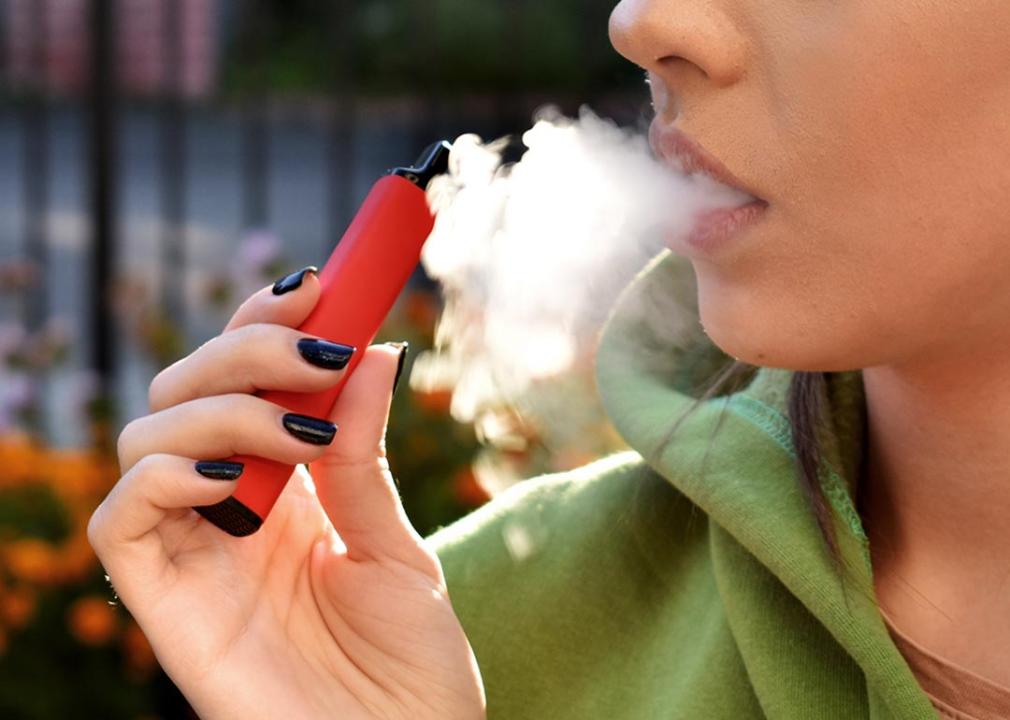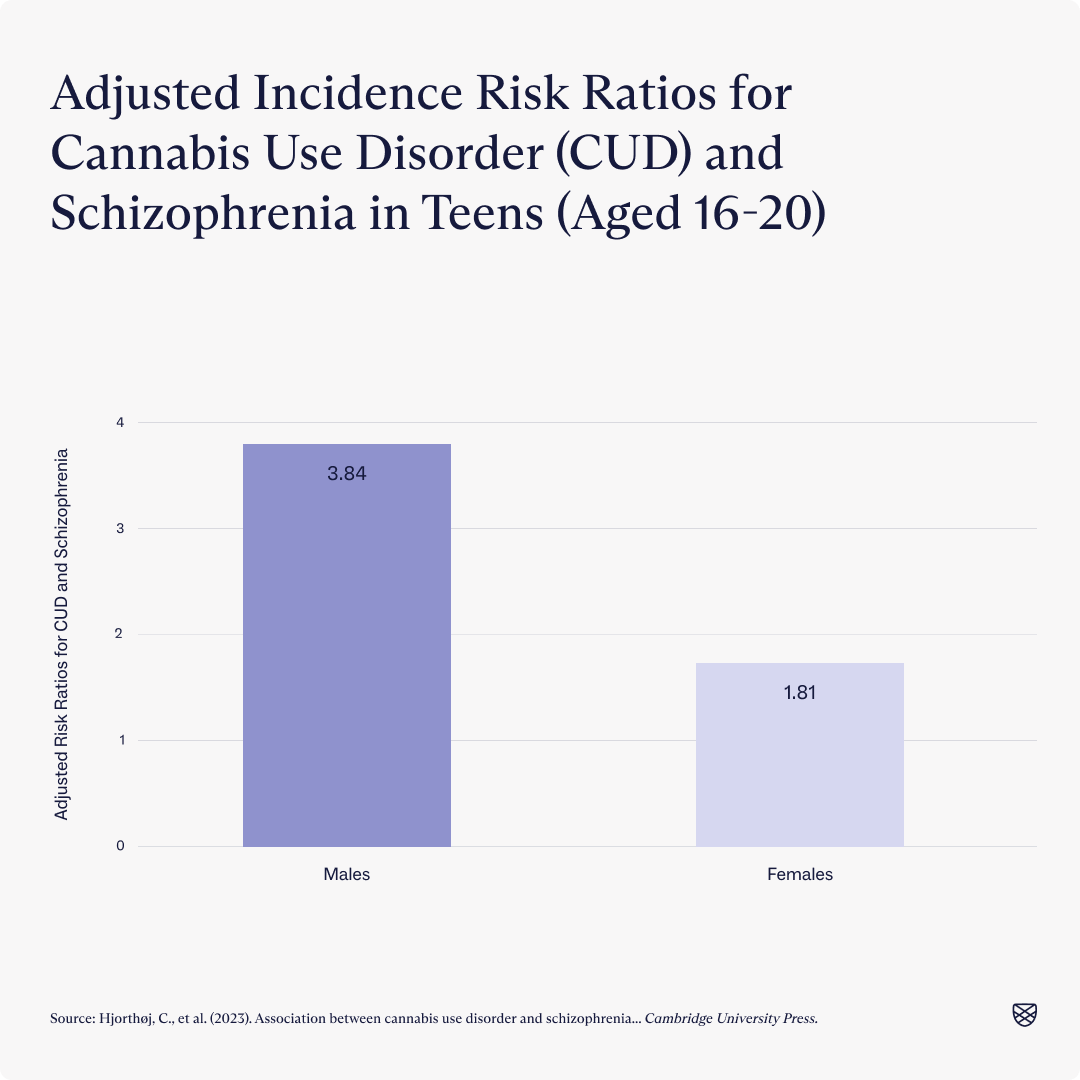
ilkov_igor // Shutterstock
Marijuana use is at an all-time high—Here's how it affects mental health
Marijuana use is at an all-time high in the United States. In the past decade alone, Americans' reported marijuana smoking has more than doubled, increasing from 7% to 13% from 2013 to 2023, according to a national poll from Gallup. And, a separate study found that half of adults (50%) now say they have tried marijuana at some point in their lives.
The reported increase in marijuana use, known formally as cannabis, parallels a shift in national policy. The U.S., historically known for its racially motivated "War on Drugs," has now seen marijuana legalized for medical or recreational purposes in three-quarters (38) of all 50 states and the District of Columbia. Roughly half of those states (24) and D.C. have legalized recreational use alone for adults aged 21 and older.
Despite these shifts in reported use and policy, experts remain largely in the dark about the effects of occasional marijuana use, a result of contested federal restrictions on research. A larger body of research, though, reveals concerns about the effects of heavy, long-term marijuana use — especially on young people's mental health.
Data shows that young people who use marijuana weekly or more double their risk of developing depression and anxiety, and cannabis use is associated with conditions like psychosis, suicide, and attention-deficit/hyperactivity disorder (ADHD) among young people.
These findings are compounded by the fact that age greatly influences the likelihood of smoking marijuana. According to Gallup's national poll, young people ages 18 to 34 are the most likely to report marijuana use of any age group surveyed — over a quarter (26%) report smoking marijuana.
To assess how marijuana affects people's mental health, Charlie Health looked at the numbers, including data on how cannabis use is linked to psychosis, depression, and other mental health conditions. We also offer some evidence-based tips on how to cope with marijuana-related mental health issues.
Heavy cannabis use has been linked to psychosis
Cannabis use has been linked to long-lasting psychotic disorders, with a stronger relationship seen with higher levels of use — a metric that can vary between studies but generally refers to people who use cannabis frequently and in large quantities, significantly more than occasional or moderate users. A review of 18 studies involving over 66,000 people found that heavier cannabis users had a significantly higher risk of developing psychosis. The meta-analysis showed that the heaviest users had about 3.9 times higher risk of schizophrenia and other psychosis-related outcomes compared to non-users.
However, as mentioned above, it's important to note that multiple factors may be at play here, and the relationship between marijuana use and mental health has been found to be bi-directional. For example, data shows that rates of marijuana use are nearly twice as high among adults with a mental health condition as compared to adults without a mental health condition.
The risk of psychotic disorders is greatest among young people with cannabis dependence
A study of nearly 7 million people looking at data between 1972 and 2021 found that cannabis use disorder (CUD) was linked to a higher risk of schizophrenia. According to the study, the risk of developing schizophrenia associated with CUD was highest among young people overall, particularly males aged 16-20. Among males aged 16-20 with CUD, the likelihood of developing schizophrenia was 3.84 (as compared to the baseline of 1.0) — more than twice the likelihood among females with CUD of the same age range (1.81). However, both of these scores still indicate that the risk of developing schizophrenia associated with CUD was highest among young people overall compared to other age groups.

Charlie Health
Occasional cannabis use increases the likelihood of depression, suicidal thoughts, and academic struggles among young people
Many studies show a positive correlation between cannabis use and depression, of which chronic use further strengthens this association. This research has been substantiated by Charlie Health, too. Upon joining treatment at Charlie Health, clients who used marijuana frequently had significantly higher rates of depression on average than those who did not use marijuana, internal data shows.
A study of over 68,000 adolescents found that compared to teens who didn't use cannabis, those who used occasionally had roughly 2 to 4 times higher odds of experiencing various negative psychosocial events, including things like depression, academic struggles, involvement in risky behaviors like fighting or getting arrested, and suicidal thoughts. The risk was even greater for adolescents with CUD, who experienced the highest rates of these negative outcomes. If you're having thoughts of harming yourself or someone else, this is a mental health emergency, and you should contact the 24/7 Suicide & Crisis Lifeline by calling or texting 988.
Marijuana may help mental health
Despite the findings above, research related to marijuana and mental health is hotly contested. Many studies concede that social and environmental demographic factors may contribute to marijuana-related mental health outcomes and that findings may be dose-related, with research typically only applying to heavy users and people who have cannabis dependencies (as mentioned above). Also, on the flip side, some studies have shown the medical and mental health benefits of marijuana use. Cannabis has been found to help address sleep-related symptoms in people with conditions like post-traumatic stress disorder (PTSD) or chronic pain, and the substance has been found to help reduce anxiety symptoms.
How to address the mental health impacts of marijuana use
Addressing the mental health effects of marijuana use is, first and foremost, about addressing the underlying mental health condition. Whether you're struggling with your relationship with cannabis use or symptoms related to cannabis use, it's important to reach out for professional mental health support. Specifically, consider reaching out to mental health professionals who are experienced in working with substance use disorders, young people, or people looking to change their relationship with marijuana.
This story was produced by Charlie Health and reviewed and distributed by Stacker Media.